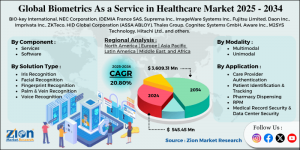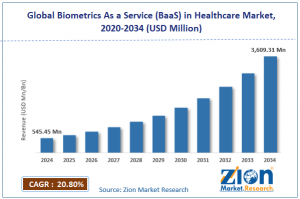Biometrics As a Service (BaaS) in Healthcare Market Size to Reach $3.6 Billion by 2034, Growing at 20.80% CAGR
The global biometric as a service (BaaS) in healthcare market size Report 2024-2034: $545M to $3.6B Transformation at 20.8% CAGR.
The global Biometric as a Service (BaaS) in healthcare market is undergoing robust expansion, driven by the demand for advanced, secure, and compliant identity verification solutions in digital health systems. Valued at USD 545.45 million in 2024, the market is forecast to reach USD 3,609.31 million by 2034, growing at a compound annual growth rate (CAGR) of 20.80% between 2025 and 2034.
Access key findings and insights from our Report in this sample - https://www.zionmarketresearch.com/sample/biometrics-as-a-service-baas-in-healthcare-market
BaaS in healthcare refers to the delivery of biometric authentication and identification capabilities—such as fingerprint, iris, facial, and voice recognition—via cloud platforms, enabling healthcare providers to enhance security, improve patient management, and streamline regulatory compliance, all without investing in on-premise infrastructure.
Key Insights:
As per the analysis shared by our research analyst, the global biometric as a service (BaaS) in the healthcare market is estimated to grow annually at a CAGR of around 20.80% over the forecast period (2025-2034)
In terms of revenue, the global biometric as a service (BaaS) in healthcare market size was valued at around USD 545.45 million in 2024 and is projected to reach USD 3,609.31 million by 2034.
The biometric as a service (BaaS) in healthcare market is projected to grow at a significant rate due to the growing advancements in cloud technology.
Based on the component, the software segment is growing at a high rate and will continue to dominate the global market as per industry projections.
Based on the solution type, the fingerprint recognition segment is anticipated to command the largest market share.
Based on region, North America is projected to dominate the global market during the forecast period.
Do You Have Any Query Or Specific Requirement? Request Customization of Report: https://www.zionmarketresearch.com/custom/9521
Market Drivers:
✅ Key Growth Factors:
Rise in Healthcare Cyber Threats: Growing concerns about data breaches, medical identity theft, and ransomware attacks are accelerating the adoption of biometric security solutions.
Increased Adoption of Telemedicine & Digital Health: BaaS ensures secure access to virtual consultations, patient portals, and EHRs.
Cloud-Based Scalability: Hospitals and clinics can implement advanced security solutions without large upfront capital investment.
Regulatory Compliance: Growing emphasis on HIPAA, GDPR, and other data protection frameworks mandates advanced authentication systems.
Growing Wearable Tech Ecosystem: Biometrics integrated with wearables allows passive patient authentication and secure health monitoring.
Market Restraints & Challenges:
Data Privacy Concerns: Storing biometric data on cloud platforms raises critical security and ethical concerns.
Lack of Interoperability: Integration challenges with legacy hospital systems may slow down implementation.
Initial Implementation Barriers: Lack of skilled professionals and awareness in developing economies.
Market Segmentation:
Alona Lebedieva: "Ukrzaliznytsia is a mirror of the wartime economy. What we see in that mirror today is alarming"
Power Electronics Market to Reach $75 Billion by 2035 with Rapid EV and Renewable Energy Adoption
Smart Home Automation Market Set to Soar to USD 679,803.80 million by 2034 Amid Rising IoT Adoption
Więcej ważnych informacji
 Jedynka Newserii
Jedynka Newserii

 Jedynka Newserii
Jedynka Newserii

Handel

1 października ruszy w Polsce system kaucyjny. Część sieci handlowych może nie zdążyć z przygotowaniami przed tym terminem
Producenci, sklepy i operatorzy systemu kaucyjnego mają niespełna dwa miesiące na finalizację przygotowań do jego startu. Wówczas na rynku pojawią się napoje w specjalnie oznakowanych opakowaniach, a jednostki handlu powinny być gotowe na ich odbieranie. Część z nich jest już do tego przygotowana, część ostrzega przed ewentualnymi opóźnieniami. Jednym z ważniejszych aspektów przygotowań na te dwa miesiące jest uregulowanie współpracy między operatorami, których będzie siedmiu, co oznacza de facto siedem różnych systemów kaucyjnych.
Ochrona środowiska
KE proponuje nowy cel klimatyczny. Według europosłów wydaje się niemożliwy do realizacji

Komisja Europejska zaproponowała zmianę unijnego prawa o klimacie, wskazując nowy cel klimatyczny na 2040 roku, czyli redukcję emisji gazów cieplarnianych o 90 proc. w porównaniu do 1990 rok. Jesienią odniosą się do tego kraje członkowskie i Parlament Europejski, ale już dziś słychać wiele negatywnych głosów. Zdaniem polskich europarlamentarzystów już dotychczas ustanowione cele nie zostaną osiągnięte, a europejska gospodarka i jej konkurencyjność ucierpi na dążeniu do ich realizacji względem m.in. Stanów Zjednoczonych czy Chin.
Handel
Amerykańskie indeksy mają za sobą kolejny wzrostowy miesiąc. Druga połowa roku na rynkach akcji może być nerwowa

Lipiec zazwyczaj jest pozytywnym miesiącem na rynkach akcji i tegoroczny nie był wyjątkiem. Amerykańskie indeksy zakończyły go na plusie, podobnie jak większość europejskich. Rynki Starego Kontynentu nie przyciągają jednak już kapitału z taką intensywnością jak w pierwszej części roku. Z drugiej strony wyceny za oceanem po kolejnych rekordach są już bardzo wysokie, a wpływ nowego porządku celnego narzuconego przez Donalda Trumpa – na razie trudny do przewidzenia. W najbliższym czasie na rynkach można się spodziewać jeszcze większej zmienności i nerwowości, ale dopóki spółki pokazują dobre wyniki, przesłanek do zmiany trendu na spadkowy nie ma.
Partner serwisu
Szkolenia

Akademia Newserii
Akademia Newserii to projekt, w ramach którego najlepsi polscy dziennikarze biznesowi, giełdowi oraz lifestylowi, a także szkoleniowcy z wieloletnim doświadczeniem dzielą się swoją wiedzą nt. pracy z mediami.





![Nestlé w Polsce podsumowuje wpływ na krajową gospodarkę. Firma wygenerowała 0,6 proc. polskiego PKB [DEPESZA]](https://www.newseria.pl/files/1097841585/fabryka-nesquik_1,w_85,r_png,_small.png)




.gif)

 |
| |
| |
|